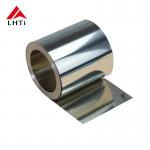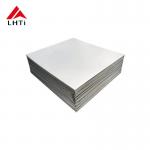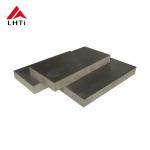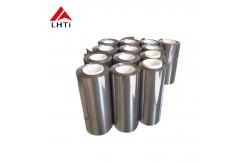Silver and Titanium Sheets: A Perfect Combination of Strength and
Versatility for Industry Applications IntroductionTitanium sheets are indispensable in high-performance industries
such as aviation, petroleum, and healthcare, thanks to their
exceptional strength-to-weight ratio and remarkable durability. In sectors where performance,
reliability, and efficiency are key, titanium alloys are
increasingly utilized to meet stringent demands. In aviation, reducing weight is essential to improve fuel efficiency and
enhance aircraft performance. By using titanium sheets in aircraft
components, manufacturers can achieve lighter, more durable parts
that improve aerodynamics and extend the lifespan of the aircraft. The material's natural corrosion resistance ensures that components can withstand harsh environmental
conditions, making titanium a top choice for both military and
commercial aviation applications.In the petroleum industry, titanium’s robustness and longevity make it an ideal
material for demanding applications like drilling tools and pipeline systems. Titanium’s ability to resist corrosion in challenging conditions,
including exposure to saltwater and acidic environments, is particularly valuable for offshore operations. Its strength
allows for the production of thinner yet sturdier materials,
optimizing equipment performance and reducing weight. This is
critical for machinery that operates under extreme pressure and
temperature. Furthermore, titanium sheets improve efficiency in oil extraction while reducing maintenance costs, contributing to a more sustainable industry.In the medical field, titanium sheets are essential for producing implants and surgical instruments. Their biocompatibility ensures that implants integrate safely with human tissue, reducing
the risk of rejection and ensuring patient satisfaction. The lightweight and durable nature of titanium also enhances patient comfort, making it a preferred choice for various medical applications.As manufacturing technologies evolve, the use of titanium sheets in
these industries is poised to grow. Innovations such as additive manufacturing and advanced alloy compositions are driving more efficient production and improved material
properties. These developments will allow for the creation of
specialized components tailored to the unique needs of each sector.
Moreover, titanium’s recyclability aligns with growing sustainability trends, making it an attractive
material for future applications in these industries. Advantages of Medical Titanium Sheets| Property | Benefit |
|---|
| Corrosion Resistance | Titanium resists corrosion from bodily fluids, ensuring durability
and longevity of implants. | | Biocompatibility | Integrates well with human tissue, minimizing the risk of rejection
and promoting healing. | | Strength-to-Weight Ratio | Lightweight yet strong, providing comfort without sacrificing
performance. | | Versatility | Can be shaped for a wide range of medical applications, from
implants to surgical tools. |
Applications of Medical Titanium Sheets| Application | Description |
|---|
| Skull Implants | Grade 5 titanium sheets provide the strength needed for cranial
repairs, offering durability and malleability for custom solutions. | | Fracture Fixation | Ti-6Al-7Nb plates and screws stabilize bone fractures, offering
strength while maintaining biocompatibility for effective healing. | | Dental Implants | ASTM F136 titanium sheets are commonly used in dental implants,
offering high-quality solutions that integrate seamlessly with
bone. | | Orthopedic Devices | Pure titanium sheets are employed in joint replacements and spinal
implants, combining strength, lightness, and biocompatibility for
effective long-term solutions. |
ConclusionTitanium sheets, with their unique combination of strength,
lightweight properties, corrosion resistance, and biocompatibility,
continue to be an essential material for high-performance
industries such as aviation, petroleum, and healthcare. As
advancements in manufacturing techniques and alloy compositions
emerge, the role of titanium will only expand, offering
specialized, efficient, and sustainable solutions across multiple
critical sectors. The continued development of titanium-based
applications will drive innovation, improve performance, and
contribute to a more sustainable future for these industries. |







